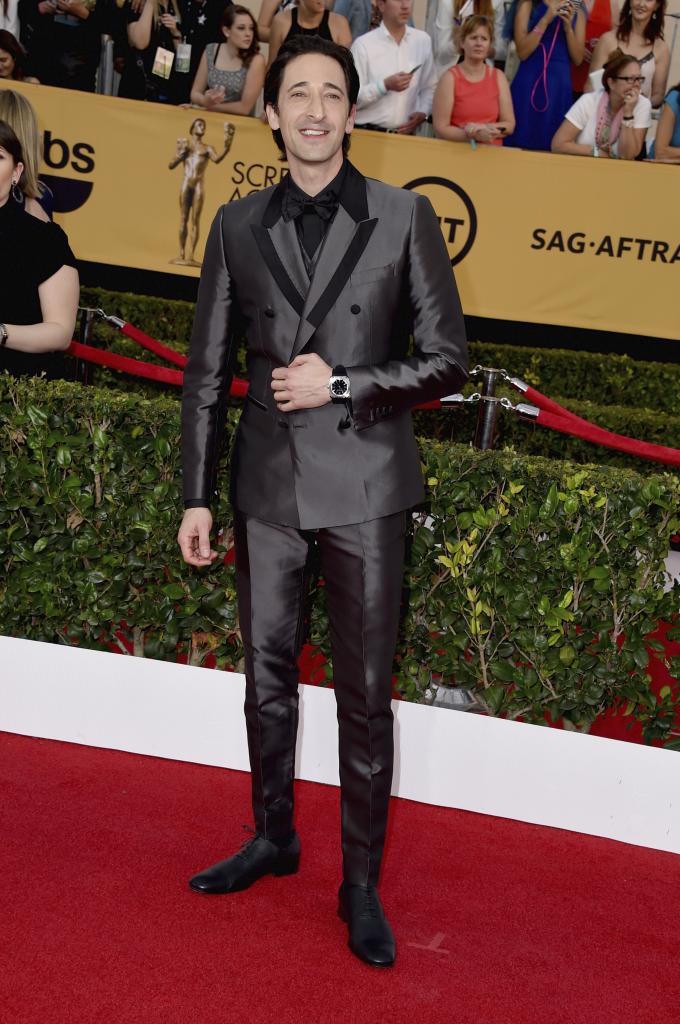Adrien Brody (New York, 1973) is what Ramón Gómez de la Serna called, not to offend but rather to linguistically describe, a tífico man. And not so much because of the typhus disease directly referred to by the adjective according to the RAE, but because of his condition as a permanently profiled man. There is no way to look at him straight on, the most cubist of actors. "One becomes thin, strangled, drained, and twisted when being a tífico," wrote the author of the predecessors of tweets that were the greguerías, and one would say that the phrase - thin, strangled, drained, and twisted itself - fits like a glove in the tífica description of the trendy actor. Because right now, that is exactly what Brody is in his most angular and piercing breadth. The chronicles tell that at just 29 years old, he became the youngest to win an Oscar for a leading role. It was thanks to The Pianist, by Roman Polanski. From then until now, more than two decades have passed in his life, a bunch of movies, a list of directors including Terrence Malick, Spike Lee, Ken Loach, and above all, Wes Anderson... and back to the beginning. His character Laszlo Toth in The Brutalist, by Brady Corbet, takes on much of the suffering of Wladyslaw Szpilman in the film that crowned him in 2002, and with the Holocaust as a threat, he insists on surviving.
"I am aware," he says by way of introduction, "that one character is related to the other. The fact that during my youth I dedicated the time I spent during that film trying to understand that moment in history with so many human lives lost due to unrestrained hatred prepared the way for me to get here. Now, returning to that period, I do it from a renewed and deeper perspective. If you learn anything from this journey, it is that one must strive to live less focused on judging others. Empathy is a value that must be recovered, especially now."
At the last Golden Globes ceremony, where he received the corresponding trophy, the presenter introduced him as "the only survivor of two holocausts." Joke more or less fortunate aside, the truth is that the Holocaust, beyond cinema, is not foreign to Brody's family. Some of his ancestors, Polish Jews, died in concentration camps. His mother, the renowned photographer Sylvia Plachy, and his grandparents, one Jewish and the other Catholic, fled Hungary and moved to the United States after the particular and failed Hungarian spring of 1956. In fact, as he himself acknowledges, in The Brutalist, where he plays a modernist and brilliant architect who flees to the United States from the Nazi horror, he imitates his grandfather's accent.
Brody speaks, and in his statements, it is not clear if he avoids the question or if, in his effort to give transcendence to each answer, he simply gets lost. What is clear is that rarely before has he made such an effort to be, or appear, the least convincing. And he continues: "The fact that the film partly reflects the difficulties of my mother and my grandparents is obviously also very significant to me. But without losing sight that I come from a completely different environment. Although maybe not so much. After all, I grew up in Queens, which is basically an immigrant community. But even if my roots were elsewhere, the story of all those people who escaped oppression and their aspirations to make the American dream their own is so powerful that the only way to tell it properly is to make it yours. Yes, definitely, everything has to be personal. Moreover, anything you see me do is personal... Or I don't do it." It is clear.
Some time ago, Brody, besides anything else, was Manolete. And that marks. It is not a pleasant memory, but perhaps precisely because of that, there is no way to forget it. "I don't think there is a parallel between Lazlo and Manolete beyond the fact that both aspire to live up to their own feelings of greatness. Otherwise, my character in The Brutalist was a victim of the greatest horror and Manolete was a victim of the expectations projected onto him by all his fans and an entire nation."
For Brody, his profession is his life. And his life, like for anyone, is everything he has. And therefore, perhaps also because of the Oscar, his insistence on making it clear. "The truly beautiful thing is to tell stories that represent all of us regardless of the era in which they take place. A human longing is to be liberated from being marginalized and persecuted; to live a life where the safety of the family is not feared; to stop being treated as lesser... Cinema and art have to fight to make this planet more inhabitable and inclusive." Brody's word, the word of a man, in the best and most gregueriano sense of the word, tífico.
